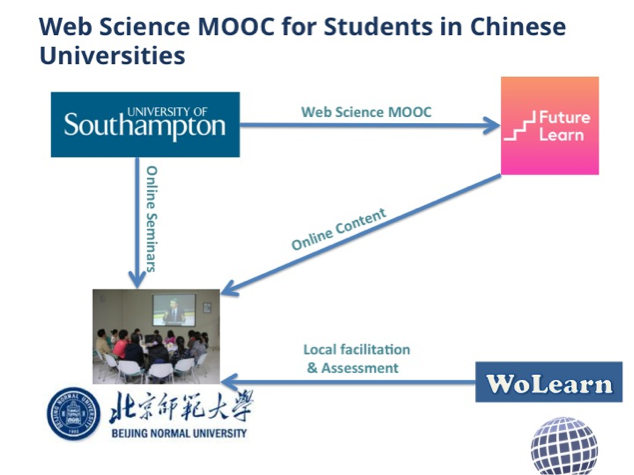Last week, I gave a presentation at the Westminster Higher Education Forum Keynote Seminar, where I explored the opportunities MOOCs provide for UK universities to develop their brand internationally and to expand their international market through online learning. My slides and transcripts below:

This diagram illustrates how MOOCs may offer a low-cost, flexible alternative for those ‘glocal‘ students, who choose to study in universities in their home countries but also gain an international experience (something that is highly valued) through studying courses online (MOOCs, the OU’s OpenLeran, etc.) that are integrated into their own university curriculum.
For institutions providing the free content, these courses can help universities to market their higher degree programmes and recruit new students who are better prepared to study on-campus in the UK, or through fully online degrees without leaving their own countries. 
As an example, we looked at the Web Science MOOC created by the university of Southampton which has been integrated into a computer science course by Beijing Normal University (BNU). 87 first year undergraduate students who are studying an introduction to computer science have signed up for the course on Futurelearn. In addition to attending lessons offered by BNU, they also watch videos online and discuss the learning materials with their peers and the tutor face to face or online. Several online seminars are delivered by academics from the University of Southampton. Online facilitations and assessments are provided by the local tutor on the Wolearn platform in China during the MOOC study. Flipped and blended learning approaches are used to make online and face to face learning more effective and integrated between the BUN course and the Web Science MOOCs.
This experiment showed how we can use MOOCs to explore new paths and models for affordable, flexible and effective international education through online or blended provisions. Furthermore, to help us understand how MOOCs might be developed to enhance UK universities’ reputation internationally and to better market their courses to potential students through partnerships with universities in other countries.
Not surprisingly, one of the challenges mentioned again during the penal discussion session was business models for MOOCs. It is clear that some institutions have seen the new opportunities presented by MOOCs as a useful motivation for re-examining their current provision and think about ways in which they can change and diversify, and consider MOOCs as a part of new strategic direction for future online provision nationally and internationally.